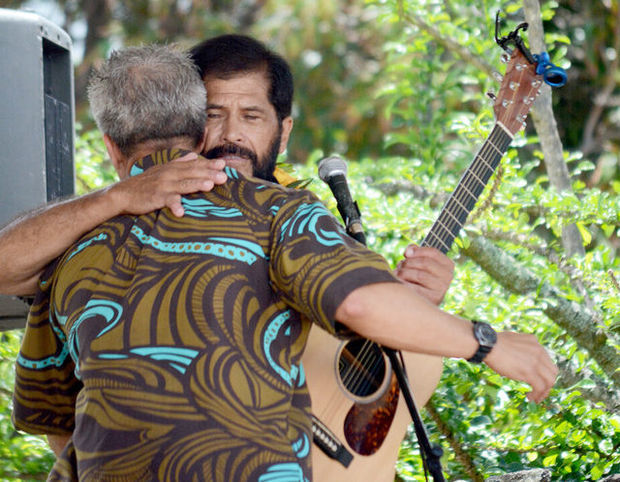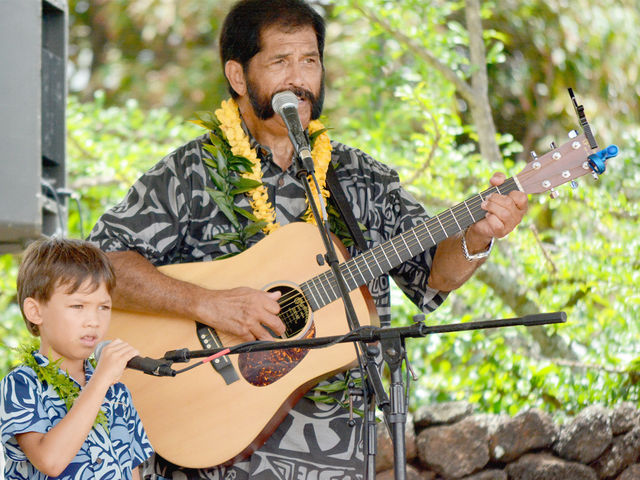LIHUE — For a lack of words, Hawaiian music legend Palani Vaughan was more than iconic, said fellow musician and friend Charles “Chucky Boy” Chock. “He was the one that brought forth stories of King Kalakaua through his music,” Chock
LIHUE — For a lack of words, Hawaiian music legend Palani Vaughan was more than iconic, said fellow musician and friend Charles “Chucky Boy” Chock.
“He was the one that brought forth stories of King Kalakaua through his music,” Chock said. “Through his work, you felt the pulse of Palani and also the king because of the arrangements that he brought.”
Vaughan, 72, died Thursday in Honolulu.
Touted for his golden voice, Frank Palani Vaughan Jr. was born May 27, 1944, and graduated from Kamehameha Schools and the University of Hawaii.
Vaughan was noted for being a key figure in the Hawaiian Renaissance.
“He had this deep golden voice that transcended time,” said Mickey Sussman, a long-time instrument ukulele and guitar maker on Kauai. “It was this inspirational voice of reclaiming heritage and culture.”
In a way, Vaughan was the voice of the Hawaiian Renaissance, Sussman said.
“He inspired a whole new generation of musicians,” he said.
Vaughan was passionate about his work of our Merrie Monarch, David Kalakaua, Chock said.
“He was always consistent with his music; he was consistent with his choice of songs,” Chock said. “It always tied in with our king. He was born to do that.”
Chock said he’s happy Palani saw his son, Kilipaki Vaughan, promoted to deputy fire chief on Kauai in November.
“I think that was a beautiful thing to witness,” he said.
Along with his UH classmate Peter Moon, Vaughan had his debut group album: “Meet Palani Vaughan & The Sunday Manoa.”
“The Sunday Manoa were younger. Before that, it was only Eddie Kamai, the Sons of Hawaii and the older folks,” Sussman said. “There was a gap in Hawaiian music. There wasn’t much new Hawaiian music being composed or played.”
Shortly after the album was published in 1967, Vaughan left the group to serve in the military.
Before the formation of Sunday Manoa, Sussman said old classics from the jazz area was being produced in the isles.
“Those guys were younger and had the connection with musicians in the 60s,” he said. “They were contemporaries.”
Vaughan later performed tributes to David Kalakaua, and recorded four albums in the 1970s and 1980s in the king’s honor.
Some of his popular recordings include “Heeia,” Ipo Lei Manu,” and “Ia Oe E Ka La.”
His first solo album was released in 1970 and was titled, “Hawaiian Love Songs.”
The few times they played music together, Chock said Vaughan’s golden voice made the sessions exceptional.
“One thing that happened when we brought Palani to play with the Royal Hawaiian Band, he said, ‘Chucky, I’m kind of nervous. My ohana is from Niihau,” he said. “It was more of a nervousness of pleasing them.”
Vaughan’s last performance with the Royal Hawaiian Band was in June of last year.
“Everyone who plays Hawaiian music can mimic his music — not so much his voice,” Chock said. “Anyone who plays Hawaiian music, plays Palani’s music.”
Vaughan was inducted into the Hawaiian Music Hall of Fame in 2008 and received the Hawaii Academy of Recording Arts Lifetime Achievement Award in 2006.
“I’m sadden by his passing,” Sussman said. “It’s just the passing of an era.”



